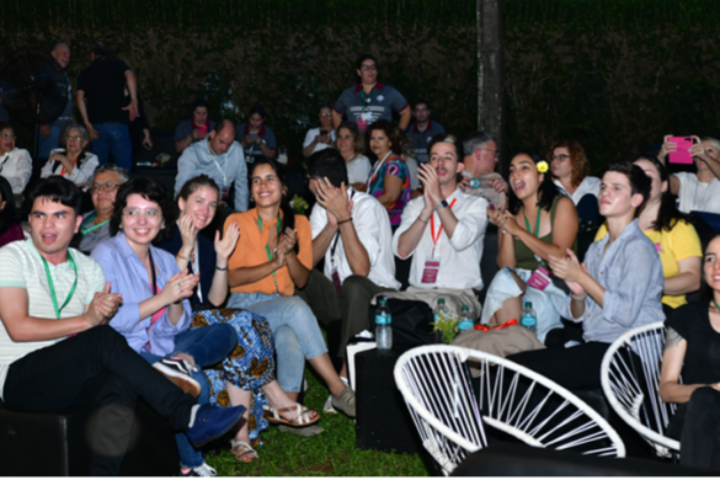August 13, 2024
Report from Young Professional Grant Recipient, 2023 ICTOP Annual Conference, Paraguay

Conference: ICOM Paraguay 2023, Museum Leadership in Climate Action. 15th-17th November 2023, Museo de ITAIPU Binacional, Tierra Guaranì, Hernandarias, Paraguay.
Lisa N.R.Pigozzi, research fellow (Milan Bicocca University), and PhD candidate in Sociomuseology (Universidade Lusofona de Lisboa), ICTOP Grant 2023
The ICOM Conference 2023 explored the role of cultural institutions in fostering and creating a culture of sustainability. It was organized by many ICOM committees which reunited together for discussing how museums, community museums and ecomuseums could represent a social agent for enhancing positive changes.
In the poli-crisis scenario that the world is facing, sustainability is not only a need, but a necessity. With the new museum definition (ICOM, 2022), museums are called to play an active role for reaching sustainability. The conference tried to answer the question: how museums can be part of the solution? Even if they have a difficult role to play, because climate change is not simple, they should start working with personal engagement for creating an articulated answers and include different perspectives. Education is another important tool for allowing museums in transformation and positive change.
Speakers from all over the world tried to answer this main question, and in the following paragraphs will be illustrated the main topics emerged during the conference, merging all the inspiring speeches.
Indigenous communities
Indigenous communities are the protectors of the territories and they know and preserve the “right to the wood”. For them, life itself is sacred. As climate change need an articulated answer to be addressed and fought, language become a great tool for breaking the silence and raise awareness, disseminating narratives on sustainability.
Indigenous communities, studied through the “ethno-development” revealed all their impact in climate action for many reasons: the “buen vivir” philosophy; their bond to nature, land, family and community; ancestral knowledge in climate; spiritual connection. Indeed, it is important to understand indigenous rights in a globalized world, especially the cultural right for fostering sustainable development of the environment. Indigenous people should help us in the reconnection and reconciliation with our ancestrals, through a spiritual connection.
Heritage
Heritage should be considered as a process, as a right and as a language (intangible heritage). Heritage is also a bridge for generations, and in a wide perspective, it should include all the living creatures.
Education
Education is an ongoing process, multidisciplinary, which have the power to transmit sustainability, indigenous values, and provoke museums mind shift. Education can be also considered as a space of dialogue where fight different social issues: racial exclusion; profit; destruction; colonialism; indigenous land extractives; Guaraní and other indigenous cultures cancelation. Education could help in the recognition of indigenous community as nature protector from which learn a culture of sustainability.
Narratives
Narrative is a powerful and versatile tool for fostering the change. It could be used for memories conservation, and for safeguarding live languages (such as indigenous ones) that are transmitted by oral culture. A language is alive when it is spoken, and not when it is written, so it is important to learn and teach indigenous languages and other oral traditions for conserving them. Narrative is also a way for interaction and should be co-constructed by many different perspectives in order to include the “dominated” classes in the main discourse, and starting to have an inclusive version of history, present and future.
Museums
Museums are places of power and responsibility, and they should activate the “indifference line”, acting with empathy for creating actions. If museums give contradictory messages, they lose people trust, so a coherent communication is fundamental for museums credibility. Moreover, to be relevant, they should act as social agent and demonstrate with practical actions and attitude their willing for sustainable future. Museums should admit their colonial past and recognise the injustice. They need a cultural change starting including different perspectives. First of all, they should recognise indigenous culture for generating change, and they should act as a visibility platform for communities. They should involve people through emotions and being a place for exchanging with communities.
The key words that should be in the goal of museums are: participation; engagement; community education. If a museum is not relevant to local communities or does not answer people needs and struggles, it could have communication problems that could be solved by “bringing the museum to people” (such as mobile museums; ecomuseums, community museums). Museums should be a place for life, for love, healing and collaboration for articulating an answer for sustainability. Museums should use active listening for fostering the change, and should create actions for visitor’s informal education.
Tourism
Over tourism is a reflection about how people do tourism, and that needs a balance. Involving local people, indigenous communities in playing an active role in museums (such as guides) could contribute in activating a change for achieving a more sustainable tourism.